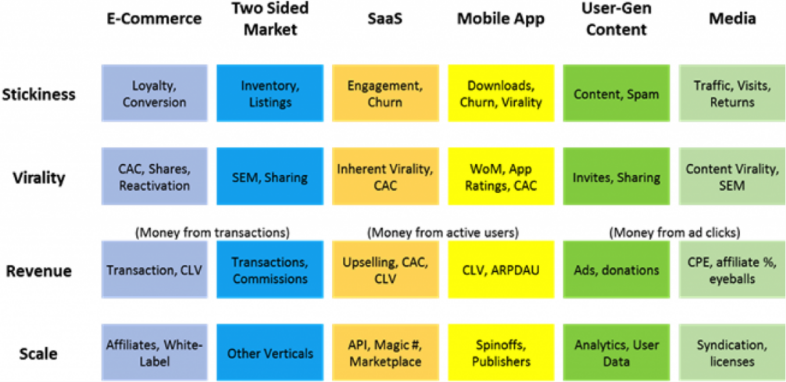
Numbers don’t lie, which is why a CEO should always rely on metrics to run and scale a company. While the prospect of looking at numbers on a daily basis may turn off most CEOs, one must never underestimate the value of numbers and what they can tell about your company’s chances for success.
In this syndicated blog post, David Teten, a Founder Institute Mentor and Partner with ff Venture Capital, extols the virtues of running a company by relentlessly monitoring its metrics, and provides a thorough method for doing so.
The blog post, "How to Run Your Company Based on Metrics: What, Why, How, Who, and When", originally appeared on David Teten’s blog, and has been republished below with permission.
I review a lot of board decks with a beautifully hand-crafted page with metrics for the company. That makes me nervous.
I prefer to see a screenshot of an internal dashboard, not something created for the board, and I prefer to see that same dashboard in the same format at every meeting. The reason is that the real value of the board deck is not (ironically) for the board; it’s for management to track their own performance. So I want to see that management is using a dashboard every day, not just for board meetings.
Good metrics are comparable across industries; comparative; readily understandable; and help drive decisions. Comparative means that you can compare a metric across time periods, groups of users, or competitors. A good metric answers one question: “What will I do differently based on this information?”. Exclude the metrics that are “vanity metrics”, e.g., Facebook likes or pageviews (for many companies). Vanity metrics do not inform, guide or improve the business; they are not actionable.
Paul Arnold of Arnold Capital observes, “For most metrics, I split out absolute values and changes over time. Operations should focus relentlessly on the latter.”
The best CEOs run their companies by their metrics. But for many CEOs, that is not their natural inclination. It means looking at numbers all day instead of people. And it means holding yourself and others rigorously accountable, which can be painful. So how do you do it?
1. Identify the metrics that matter.
The most common financial metrics ffVC asks companies to compare vs. budget are:
- Gross Revenue
- COGS
- Gross Profit
- Payroll Expenses
- Net Income (Loss)
- Cash Burn
- Available Cash
- Remaining Runway
For early stage companies, the metrics that matter might typically center around activation, engagement and retention. For them, the key thing to measure is if the product is serving users’ needs in such a way that they will continue to use it (and ideally, find life without it hard to imagine). Josh Gebhardt, CEO, MetricStory, observes that horizontal spread across and within an organization’s functional siloes is a good metric for B2B products.
In addition, we typically ask portfolio companies to report on the following non-financial metrics:
Universal Metrics
- Headcount
- # Users/Customers
- Customer Acquisition Cost (CAC)
- Customer Lifetime Value (CLTV)
- Churn %
- Monthly Recurring Revenue (MRR)
- Sales Pipeline
- Conversion to Sales %
Metrics for Certain Categories of Startups
- Company-Specific KPIs
- App downloads
- Unique visitors
- SaaS-Specific KPIs
- SaaS Quick Ratio
- Net MRR Churn %
- LTV/ CAC Ratio
- Months to Recover CAC
- Average Revenue Per Account
- Average Contract Length
- Months Paid Upfront
Steve Cody, CEO of The Better Software Company* observed, “To drive the growth numbers that we need and reinforce our culture, we keep our key sales metrics up on three live monitors in the office. Customers, MRR and key activities are the firewood to keep us going.”
Lean Analytics recommends this set of metrics for some of the major categories of startups:

2. Create a management dashboard.
I suggest looking at dashboard tools such as Anaplan, ChartMogul, Domo, Fathom, Geckoboard, GoodData, RJ Metrics, Microsoft Power BI, Mode Analytics, or Tableau. TrustRadius has a helpful high-level overview of business intelligence tools, as does G2Crowd.
3. Track employee performance particularly rigorously.
Useful tools: Betterworks, 15Five.
4. Benchmark against comparables.
A metric is much more valuable once you have established a benchmark. This will let you know what is ideal or normal for the metric that you are tracking. Google Analytics just announced benchmarking capability. Compass.co and Payscale offer industry metrics.
5. Report your company’s performance against your planned financials and pre-determined metrics in your board meeting.
Even if you don’t have a formal board of directors, I’d strongly recommend that founders create an informal board of advisors and run it like a formal board of directors. I’ve previously posted a template board deck; also see A16Z’s preferred startup metrics.
ffVC’s CFO Group actively helps companies to become more metrics-driven. My colleague Cristian Valbuena, Controller of Portfolio Accounting, recently spent 3 days on-site at an ffVC company learning about the company, its needs and timeline. Since one of the goals of the CFO Group is to make companies become more metrics-driven, Cristian took the opportunity to help the CEO achieve this goal. Cristian provided the company with a list of KPI’s that it should track based on its goals and industry.
The CEO mentioned that he also wanted to track additional metrics. Some of the metrics that the CEO wanted to track were “Vanity Metrics” (data on which you cannot act). So Cristian and the CEO went through the list, and determined which would be the most relevant to track, based on the current stage of the company and the goals for the next year.
During this time, Cristian also explained to the CEO why some of the metrics were not appropriate. For example, number of visits to your website doesn’t tell: 1) how many people are visiting your site - one person visiting the site 100 times, or 100 people visiting once each; or 2) what action did they take (convert or bounce). A better metric is a combination of number of unique visitors and conversion rate. Not only are they better metrics to help you understand your sales funnel, but also can be used as valid assumptions to help you predict future sales.
Once they had identified their preferred metrics, Cristian provided the company with industry averages for those metrics that were selected. This will help the CEO determine if the metrics are in the ballpark or whether he has to optimize them. Obviously, some companies can be outliers in comparison to the mean, but it is still important to be aware of where you are positioned. In many businesses, there may also be some metrics unique to your business, which don’t have any baseline, but are crucial to your company.
Being metrics-based is not something that you establish once and you forget about it. My colleague Paul Bianco created ffVC’s FP&A Team (part of our overall CFO Group) to help our companies dig deeper into the numbers than just GAAP financials. Paul took on this initiative after realizing how alarmingly little a P&L and Balance Sheet alone can tell you about what’s really happening at a startup.
Our FP&A group works with our companies to create financial strategies that bridge the gap between what’s currently happening with the business and what the company hopes to achieve. In doing this, they dig into the key drivers of the business and seek areas for improvement. These of course vary widely depending on the Company. For example, for a direct sales model, Paul tends to first look at sales efficiency: the cumulative profit/loss generated by the sales team (and on a per rep basis), net of salary, commissions, etc. From there, if there are issues, the team digs into the root cause: is the sales team just not booking enough sales? Is it churn? If so, is it a product issue or is the product being oversold?
These are the types of questions we strive for our companies to track and continually improve upon.
For more advanced entrepreneurial advice and insights, check out David Teten's blog.
(Image of businesswoman standing on ladder and drawing on wall image by Shutterstock)



